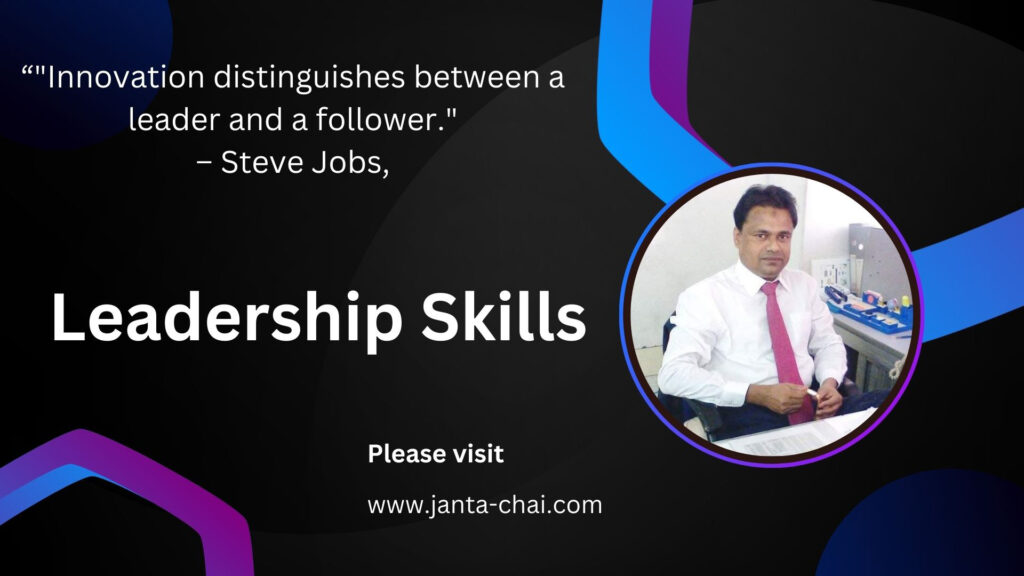Effective Leadership Skills for Career Growth:

In professional life, leadership skills are critical for career advancement. Suppose you are a leader; how can you impress your team? Effective leaders inspire teams and create a positive work environment. Always remember, if you cannot make a team, you can’t succeed. What happens if you have enough leadership skills? Strong leadership ensures professional success and organizational growth in today’s competitive world. Let’s find out how to improve your leadership skills. In detail, explained by this blog
Communication Skills
Practical communication skills build trust and ensure transparency. As a leader, you must have leadership skills, so you have to increase communication. Effective communication builds confidence and ensures clarity. A leader expresses his ideas and listens actively. Through their communication skills, they provide constructive feedback and encourage open discussions. Strong communication fosters collaboration and resolves conflicts efficiently. Thus, communication skills will strengthen your leadership skills, improving your career.
Emotional Intelligence:
If you have achieved leadership skills, you need high emotional intelligence. Because you need to understand the emotions of the team and manage the team accordingly. You need to show empathy, and compassion, control their reactions, and build meaningful relationships. Therefore, only those who have achieved emotional intelligence can gain the support of their team members. Therefore, you need to adapt to change and then you can develop effective leadership that will make your career more successful.
Decision-making ability.
If you achieve leadership skills, you must acquire the ability to make good decisions. Strong leaders make informed and timely decisions. You must make decisions by analyzing data, considering different perspectives, and evaluating possible outcomes. As a leader, you must take responsibility for your choices and learn from past mistakes. Also, make good decisions to build confidence in the team and drive progress. For example, good decisions for building a good team include choosing the right people, setting clear goals, effective communication, and building trust and cooperation within the team.
Problem-Solving Skills.
As a good leader, you must have problem-solving skills. Because as a leader, you will face challenges every day. Effective problem-solving requires analytical thinking, creativity, and resilience. Leaders can be able to find out the root cause of the problem and solve it intelligently by applying the best strategy. You must encourage the team to find innovative solutions and improve productivity. If the team understands that you are a skilled problem solver, then you can easily gain the trust of the team and improve your career.
Adaptability and Resilience:
In a changing world, change is constantly occurring, sometimes expected and sometimes unexpected. As a leader, if you cannot adapt to these changes, you will not be a successful leader. To acquire leadership skills, you need to be adaptable. In today’s rapidly changing work environment, adaptability is crucial. Change provides learning opportunities. Resilient leaders overcome obstacles with a positive attitude and inspire their teams to stay focused.
Delegation and Empowerment:
Delegation refers to the act of leading, i.e., being a representative for someone or a group or society. Empowerment of a group of like-minded people is the degree of autonomy and self-control within people and communities. It enables you to represent them in a responsible and self-determined way, acting on your authority. If you want to be a good leader, you need to trust your team. Because great leaders trust their team and delegate effectively, they assign tasks based on individual strengths and encourage employees to take ownership. Empowered employees feel valued, which increases their motivation and performance. So, to improve leadership skills, you need to focus on delegation and forgiveness.
Vision and Strategic Thinking
As a leader, you must have vision and strategic thinking. Essential leadership skills that drive long-term success. A strong leader possesses a clear vision, inspiring teams with a compelling future goal. They anticipate industry trends, adapt to market changes, and align organizational objectives with a broader mission. Strategic thinking involves analyzing challenges, identifying opportunities, and making informed decisions that lead to sustainable growth. As a leader, you must evaluate risks, allocate resources wisely, and develop innovative solutions to stay ahead of competitors.
Integrity and Ethics
To be an effective leader, you must have integrity and ethics, which are the most important qualities. Integrity is the foundation of leadership, which creates credibility and transparency. An honest leader leads the team with integrity, which inspires employees and increases their confidence.
Ethics will strengthen your leadership. It helps set the standard through fair decision-making, responsibility, and honesty. Correct and ethical decisions ensure the long-term success of the team and the organization.
An ethical leader matches his words with his actions, values the opinions of others, and makes decisions above selfishness. This makes employees feel comfortable and brings more sincerity to their work. Without integrity and ethics, true leadership is impossible. It not only moves the individual but also the entire organization forward on the path to success. Professional relationships are strengthened and workplace culture is enhanced by an ethical approach.
Conflict Resolution Skills
One of the most important qualities of a skilled leader is the ability to resolve conflict. Disagreements and conflicts are a natural occurrence in any organization, but an effective leader can resolve them with intelligence, patience, and a strategic approach. The first step in resolving conflict is to identify the root cause of the problem. You need to listen to the opinions of both parties, analyze the information, and make an impartial decision. Solving problems through dialogue and compromise strengthens team bonds and builds mutual respect among employees.
If you are a successful leader, then you must use emotional intelligence to control anger and frustration. This will make the team more cohesive, motivated, and productive. Conflict resolution is an essential quality of skilled leadership, which ensures a peaceful and effective work environment and helps the organization achieve long-term success.
Self-awareness and continuous learning
Self-reflection and continuous learning are very important for effective leadership. Self-awareness helps you understand your strengths, weaknesses, emotions, and behaviors so that you can be more confident and effective. A self-aware leader knows how to admit his mistakes, accept constructive criticism, and strive for improvement. On the other hand, continuous learning prepares a leader to face changing situations and new challenges. To keep up with changes in today’s competitive world, a leader needs to learn new skills, technologies, and techniques. You can increase your knowledge and skills by reading books, taking training, and learning from experienced people.
A self-aware and learning-oriented leader is capable of creative thinking and innovative decision-making, which plays an important role in the improvement of the team and the organization. Therefore, self-knowledge and a continuous learning attitude are one of the main foundations of successful leadership.
Conclusion
As a successful leader, you must distinguish between adaptability, strategic thinking, and ethical integrity to foster trust and collaboration. By developing these skills, you will be able to realize your leadership potential and achieve long-term success. Leadership is not just about authority; it is about inspiring others and driving positive change in any organization. If you want to advance your career, you must develop your leadership skills.
Author: Md. Abdul Aziz
Head Sample & Innovation
Standard MH Group
